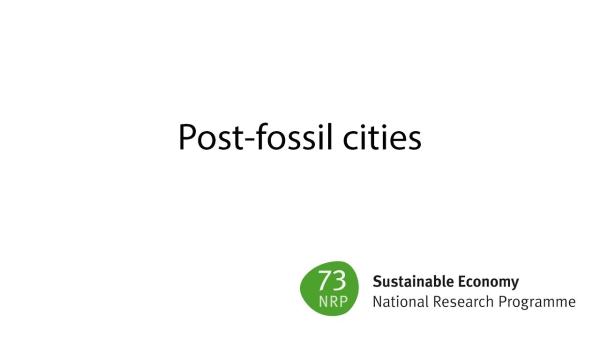Post-fossil cities
The simulation game “postfossilCities” provides an experimental space to explore the transformation to climate-neutral, post-fossil cities. The game is designed for current and future decision-makers, but can be played by all interested people. postfossilCities can be played in facilitated workshops, which are conducted on-site or virtually.

Background
In view of reaching the climate goals of the Paris Agreement, it is essential that the transformation of cities is actively reflected in an inter- and transdisciplinary process. This requires approaches and tools that enable a systemic perspective on the transformation, such as system modelling and games. While games have shown to be a viable means to facilitate experiential learning and increase personal engagement of players, system modelling enables users to test the effectiveness of policy measures.
Aims
The main goal of this project was to develop and apply a generic simulation game that allows players to find and evaluate pathways towards possible future cities under consideration of natural environment and societal constraints. Besides elements such as roles, game board and action cards, the game would include a model of the socio-economic metabolism of the Swiss economy with a focus on housing and transportation, and a simulation engine to run this and other complementary models, allowing players to test potential pathways to the post-fossil city from a systemic perspective.
Results
Playing the transformation to a post-fossil city
The simulation game allows players to test climate change mitigation measures in a collaborative experimental setting and to experience synergies and trade-offs among the societal actors they represent. It has been designed for current and future decision-makers to inform about crucial aspects of the transformation to post-fossil cities, but can be played by all interested people. Currently it is available in English and German and can be played in facilitated workshops of 3 to 8 hours, both on-site and virtually. Playing the postfossilCities simulation game highlights the urgency of climate change and mitigation measures. Players learn about prioritizing mitigation measures in regard to effectiveness and timing; this may lead to the revision of existing mental models, e.g. regarding climate goals.
Sector-specific scenario analysis showcases impact of mitigation measures
In view of simulating pathways towards possible future cities in the game, but also to analyse climate change mitigation strategies in the Swiss residential building sector and the Swiss passenger car sector, several socio-economic metabolism models were developed. The scenario analysis for the two sectors showed that technology-driven measures (e.g. phase out of fossil fuels, higher energy standards and renovation rates, car electrification) are highly effective in lowering greenhouse gas (GHG) emissions, but that the full mitigation effect can be severely delayed by the time it takes to replace the existing technology stock. In contrast, lifestyle-driven measures (e.g. lower indoor temperatures, heated surfaces and floor area per capita, increased use of ride-sharing) were observed to be highly effective in reducing direct energy consumption with an immediate impact as they improve on the existing stock.
The scenario analysis also showed that meeting all the climate goals (energy and emissions related goals) in the two sectors is possible by a combination of technology- and lifestyle-driven measures, provided that their magnitude and timing are well coordinated. To enable the integration and experimentation with these and other models into the postfossilCities game in an easy-to-use manner, a simulation engine based on the newly developed, agent-based “Agent Using Models” approach has been designed and implemented.
Implications for research
In this project, two detailed socio-economic metabolism models addressing the residential building stock and the passenger car fleet were developed. Both models can serve as a robust basis for future research, including e.g. the evaluation of circular economy strategies. The “Agent Using Model” that has been developed to allow combining and co-executing various types of models in turn has the potential to be applied and further developed in other contexts where experimenting with heterogeneous models from different modelling paradigms is required.
Implications for practice
The postfossilCities simulation game developed in this project allows participants of game workshops to experience at first hand the urgency of climate action and the value of alliances across stakeholder boundaries. The game, which includes a set of 204 action cards, is suited for current and future decision-makers, e.g. from public administration, industry and politics, as well as for interested people in general. As reported by climate experts participating in game workshops, postfossilCities effectively conveys relevant facts in their overall context.
Publications
Project leaders
Dr. Patrick Wäger
Empa
Prof. Dr. Lorenz Hilty
Institut für Informatik, Universität Zürich
Prof. Dr. Daniel Müller
Department of Energy and Process Engineering, Norwegian University of Science and Technology (NTNU)
Project partners
Dr. Markus Ulrich
UCS Ulrich Creative Simulations GmbH, Zürich
Prof. Dr. Susanne Kytzia
Institut für Bau und Umwelt, Hochschule für Technik Rapperswil (ab 01.01.2019)



